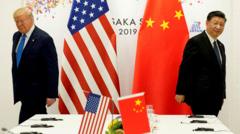Hungary has announced its decision to withdraw from the International Criminal Court (ICC), a move that coincides with Israeli Prime Minister Benjamin Netanyahu's state visit to the country, where he faces an arrest warrant issued by the ICC. This decision, made public by a senior official of Prime Minister Viktor Orban's administration, echoes growing tensions surrounding international judicial authority and national sovereignty. The ICC previously asserted that there were substantial grounds for Netanyahu's alleged involvement in war crimes during the Israel-Hamas conflict. The implications of Hungary's exit raise questions about the future of international justice norms and the reception of political alliances among nations.
Hungary Exits International Criminal Court Amid Netanyahu's Visit

Hungary Exits International Criminal Court Amid Netanyahu's Visit
Hungary's withdrawal from the ICC occurs concurrently with Israel's leader standing under an arrest warrant, stirring international discourse.
Hungary confirmed its departure from the International Criminal Court (ICC) just hours after Israeli Prime Minister Benjamin Netanyahu arrived for a state visit, amid an outstanding arrest warrant against him. Prime Minister Viktor Orban's government spokesperson verified the withdrawal, which recognizes Hungary as the first member of the European Union to make such a decision. Orban had previously indicated that the ICC's ruling would not influence domestic matters, expressing concern over the court's political bias during a joint press conference with Netanyahu. The ICC possesses the jurisdiction to prosecute serious crimes such as genocide and crimes against humanity, serving as a major component of global justice efforts.
Netanyahu's administration lauded Hungary's choice as a principled stand against what they describe as a corrupt institution, framing it within the broader context of shared values among democracies. The withdrawal, while politically significant, does not directly impact the ICC's operational structure nor ongoing cases. Critics, including other European leaders, have denounced Hungary's stance as detrimental to international law, emphasizing the need for adherence to legal frameworks. As Hungary prepares to submit its formal notification of withdrawal to the United Nations, the symbolic ramifications of its action could inspire parallel movements in other nations and raise further debates surrounding accountability on the global stage.





















